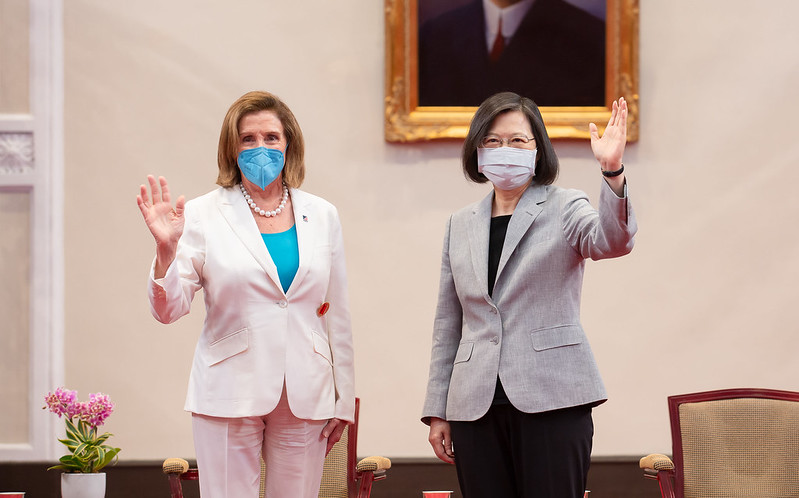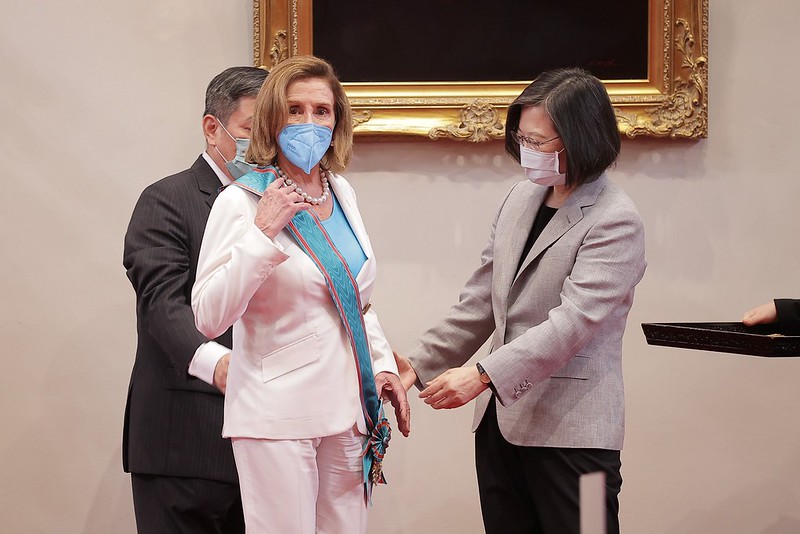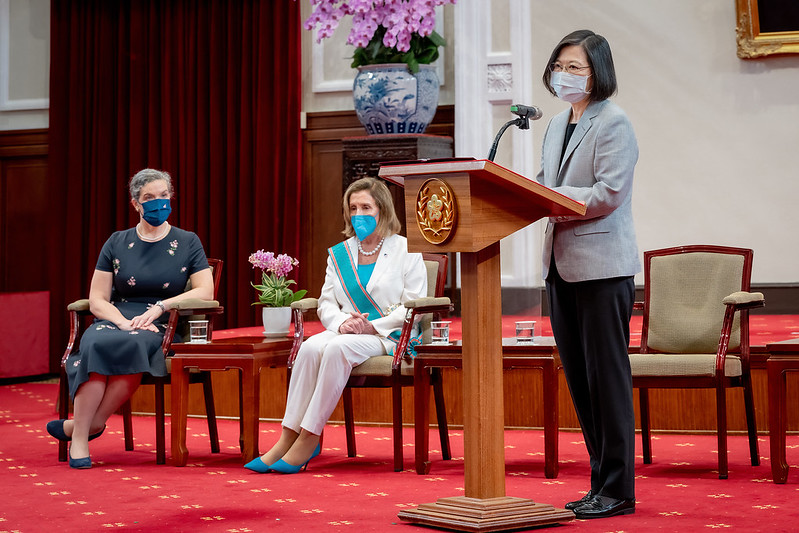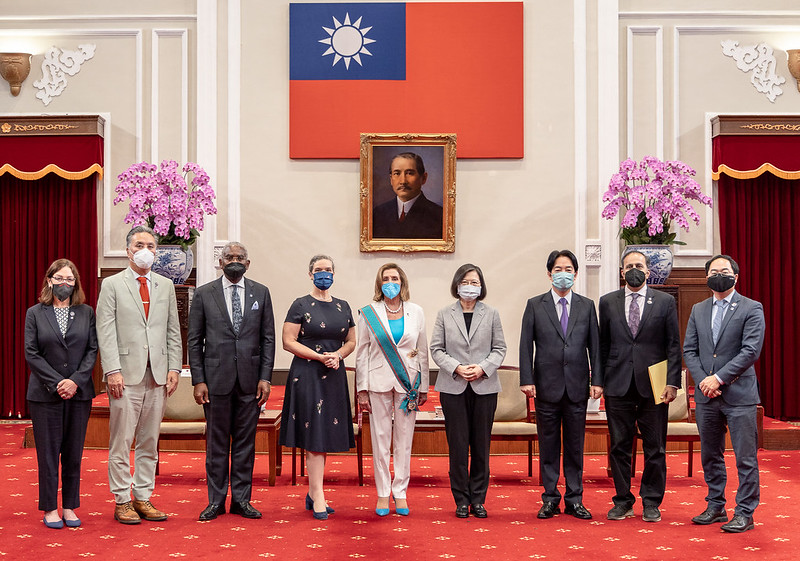News & activities
 News releases
News releases
On the morning of August 3, President Tsai Ing-wen met with a delegation led by Speaker of the United States House of Representatives Nancy Pelosi, and presented the speaker with the Order of Propitious Clouds with Special Grand Cordon to thank her for her longstanding efforts to enhance Taiwan-US relations across the board and for supporting Taiwan's international participation. President Tsai also expressed hope that our continued cooperation will further advance bilateral relations, that Taiwan and the US will continue to support each other, and that we will work together as steadfast partners to make democracy shine even brighter.
A translation of the president's remarks follows:
I would like to extend a very warm welcome to Speaker Pelosi and the delegation. In our previous transit stops in the US, Vice President Lai and I always received calls from the speaker to welcome us and exchange views on Taiwan-US relations. I am delighted to meet face-to-face with the speaker in Taiwan this time.
Speaker Pelosi is truly one of Taiwan's most devoted friends. The representatives here today are all important leaders in the House, and have long made proactive efforts to promote progress in Taiwan-US relations across the board. We are truly grateful to you for making this trip to show the US Congress's rock-solid support for Taiwan.
Speaker Pelosi has deep and longstanding ties with Taiwan. In October 1999, the speaker visited Taiwan and expressed particular concern over the 921 Earthquake and its aftermath. In the two decades following the earthquake, Taiwan not only emerged from the shadow of this disaster, but also weathered multiple challenges. Over the past two decades, Speaker Pelosi has continued to pay close attention to democratic developments in Taiwan and demonstrated unwavering support for Taiwan's international participation. Madame Speaker, I must extend my most heartfelt gratitude to you. Thank you for your support.
I have great admiration for Speaker Pelosi, who has long stood firm in safeguarding freedom, democracy, and human rights; who never hesitates to confront head-on rhetoric and behavior that undermine democratic values. The speaker's courage and actions are deeply inspiring and touching.
Russia's invasion of Ukraine earlier this year has made security over the Taiwan Strait another focus of worldwide attention. Aggression against democratic Taiwan would have a tremendous impact on the security of the entire Indo-Pacific.
I would like to take this opportunity to explicitly convey to you Taiwan's key principles in facing uncertainties. First, facing continued, deliberately heightened military threats, Taiwan will not back down. We will firmly uphold our nation's sovereignty and continue to hold the line of defense for democracy. At the same time, we wish to cooperate and work in unity with all democracies around the world to jointly safeguard democratic values.
Second, we will do whatever it takes to strengthen Taiwan's self-defense capabilities. Taiwan is committed to maintaining peace and stability in the Taiwan Strait, and we will make Taiwan a key stabilizing force for regional security, ensuring a free and open Indo-Pacific as well as the stable development of global trade and supply chains.
Third, Taiwan is a reliable and trustworthy partner of the United States. We will continue to work with the US Congress, as well as the administration, to strengthen cooperation in areas such as Indo-Pacific security, economic development, talent cultivation, and supply chains, so as to further elevate Taiwan-US relations.
Once again, I welcome Speaker Pelosi and the delegation to Taiwan. Thank you for taking concrete action to show staunch support for Taiwan at this critical moment and for expressing the US's consistent policy supporting Taiwan's self-defense. The Order of Propitious Clouds with Special Grand Cordon represents our gratitude to Speaker Pelosi as well as our wish to continue advancing Taiwan-US relations through greater cooperation.
To close, thank you all again for coming. Taiwan and the US will continue to support each other, and be steadfast partners in our joint efforts to make democracy shine brighter. Thank you.
Speaker Pelosi then delivered remarks, a transcript of which follows:
Thank you, Madam President. It is such a high honor to receive the Order of Propitious Clouds with Special Grand Cordon from you. We are so proud of your leadership – a woman president in one of the freest societies in the world.
It's with immense admiration for your leadership and great personal humility that I accept this award. Humility because I accept it, not for me only, but for our members of Congress who were so instrumental in all that you said about our accomplishments together – Democrats and Republicans, House and Senate, both sides of the aisle, united in our support for Taiwan.
This time, I am so excited to receive this award on behalf of the United States Congress, as I said. It's just unwavering – the response that we had to our visit was so positive from our colleagues. I look forward to displaying this award in the Speaker's Office – or wearing it there – in the Capitol as a symbol of our treasured friendship.
Madam President, I think it's important to remind some and inform others of how we are here. Forty-three years ago, with the Taiwan Relations Act, America made a bedrock promise to always stand with Taiwan. And on this strong foundation, we have built a thriving partnership grounded in our shared values of self-government and self-determination, focused on our mutual security interests in the region and across the world, committed to the economic ties that power prosperity for all of our people.
Today, our delegation, of which I'm very proud, came to Taiwan to make unequivocally clear: we will not abandon our commitment to Taiwan, and we are proud of our enduring friendship.
And may I mention, they're all co-chairs of this delegation: the chair of the Foreign Affairs Committee, Mr. Gregory Meeks of New York; the chair of the [Veterans' Affairs] Committee, Mr. [Mark] Takano of California; the vice chair of the Ways and Means Committee, Congresswoman [Suzan] DelBene of Washington State; the member of the Intelligence Committee and a leader in [the] COVID fight and so many things in the Congress, Congressman Raja Krishnamoorthi from, I say Illinois, he says Chicago; and again, one of our newest members of Congress, [who] served as a diplomat in the State Department before coming, Congressman Andy Kim, of not only the Armed Services Committee but also the Foreign Affairs Committee and others. We're very proud of our delegation. And as you'll be hearing from them in the course of our visit, you will know even more [who] we are.
Thank you to our delegation. And we're proud to be here with the Vice President, with Minister [Joseph] Wu, with other distinguished leaders who are here with you, Madam President. Thank you for your leadership.
The story of Taiwan is an inspiration to all freedom-loving people in the United States and around the world. Out of a crucible of challenge, you have forged a flourishing democracy, one of the freest in the world, proudly to be led by a woman president. (That's an applause line.)
Taiwan has been an island of resilience in the world. Indeed, the people of Taiwan have proven to the world that, with hope, courage, and determination, it is possible to build a peaceful and prosperous future, even in terms of the challenges you face. And now, more than ever, America's solidarity with Taiwan is crucial, and that is the message we are bringing here today.
When we travel and leave the country as a congressional delegation, security, to protect our people as well as global security, economy, to spread prosperity in our own country and others, and governance are three pillars of our travel. In all three areas, we have great cooperation and friendship with Taiwan, and we value that.
I just want to mention and congratulate Taiwan for your governance of the COVID issue, the COVID pandemic. You're a model to the world in terms of the cooperation of the people and the success of your initiatives. Congratulations, Madam President. Congratulations to the people of Taiwan for following the lead and suggesting their own proposals.
Today, the world faces a choice between democracy and autocracy. America's determination to preserve democracy here in Taiwan and around the world remains ironclad, and we are grateful to the partnership of the people of Taiwan in this mission.
I'm very grateful to receive this award. I'm grateful to you, Madam President, [and] to the people for their enduring friendship. I'm very blessed, as are my colleagues, with many Taiwan-Americans [sic] who are very excited about our visit. And in fact, when I came before, in [19]99, I came with them, and we learned a lot.
And that's what we came to do, to participate in the Asia-Pacific initiative in a way that is appropriate for Taiwan to be successful, whether in trade, security, et cetera. And to do so in a way that opens many more possibilities.
We came here to listen, to learn, and, what do you know, I got this beautiful, beautiful, beautiful award, the Order of Propitious Clouds with Special Grand Cordon. Thank you, Madam President.
The delegation also included US House Committee on Foreign Affairs Chairman Gregory Meeks, Veterans' Affairs Committee Chairman Mark Takano, Ways and Means Committee Vice Chair Suzan DelBene, House Oversight and Government Reform Subcommittee on Economic and Consumer Policy Chair Raja Krishnamoorthi, and Congressman Andy Kim, and were accompanied to the Presidential Office by American Institute in Taiwan Taipei Office Director Sandra Oudkirk.












